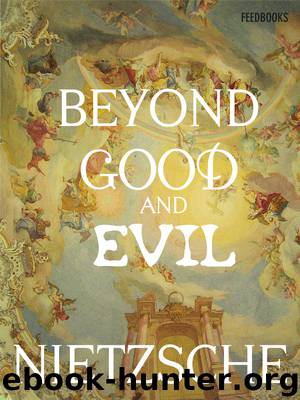Beyond Good and Evil by Friedrich Wilhelm Nietzsche

Author:Friedrich Wilhelm Nietzsche [Nietzsche, Friedrich Wilhelm]
Language: eng
Format: epub, mobi
Tags: Non-Fiction, Philosophy
Publisher: Feedbooks
Published: 1886-09-25T05:00:00+00:00
208. When a philosopher nowadays makes known that he is not a skeptic—I hope that has been gathered from the foregoing description of the objective spirit?—people all hear it impatiently; they regard him on that account with some apprehension, they would like to ask so many, many questions … indeed among timid hearers, of whom there are now so many, he is henceforth said to be dangerous. With his repudiation of skepticism, it seems to them as if they heard some evil- threatening sound in the distance, as if a new kind of explosive were being tried somewhere, a dynamite of the spirit, perhaps a newly discovered Russian NIHILINE, a pessimism BONAE VOLUNTATIS, that not only denies, means denial, but-dreadful thought! PRACTISES denial. Against this kind of "good-will"—a will to the veritable, actual negation of life—there is, as is generally acknowledged nowadays, no better soporific and sedative than skepticism, the mild, pleasing, lulling poppy of skepticism; and Hamlet himself is now prescribed by the doctors of the day as an antidote to the "spirit," and its underground noises. "Are not our ears already full of bad sounds?" say the skeptics, as lovers of repose, and almost as a kind of safety police; "this subterranean Nay is terrible! Be still, ye pessimistic moles!" The skeptic, in effect, that delicate creature, is far too easily frightened; his conscience is schooled so as to start at every Nay, and even at that sharp, decided Yea, and feels something like a bite thereby. Yea! and Nay!—they seem to him opposed to morality; he loves, on the contrary, to make a festival to his virtue by a noble aloofness, while perhaps he says with Montaigne: "What do I know?" Or with Socrates: "I know that I know nothing." Or: "Here I do not trust myself, no door is open to me." Or: "Even if the door were open, why should I enter immediately?" Or: "What is the use of any hasty hypotheses? It might quite well be in good taste to make no hypotheses at all. Are you absolutely obliged to straighten at once what is crooked? to stuff every hole with some kind of oakum? Is there not time enough for that? Has not the time leisure? Oh, ye demons, can ye not at all WAIT? The uncertain also has its charms, the Sphinx, too, is a Circe, and Circe, too, was a philosopher."—Thus does a skeptic console himself; and in truth he needs some consolation. For skepticism is the most spiritual expression of a certain many-sided physiological temperament, which in ordinary language is called nervous debility and sickliness; it arises whenever races or classes which have been long separated, decisively and suddenly blend with one another. In the new generation, which has inherited as it were different standards and valuations in its blood, everything is disquiet, derangement, doubt, and tentativeness; the best powers operate restrictively, the very virtues prevent each other growing and becoming strong, equilibrium, ballast, and perpendicular stability are lacking in body and soul.
Download
Beyond Good and Evil by Friedrich Wilhelm Nietzsche.mobi
This site does not store any files on its server. We only index and link to content provided by other sites. Please contact the content providers to delete copyright contents if any and email us, we'll remove relevant links or contents immediately.
| Anthropology | Archaeology |
| Philosophy | Politics & Government |
| Social Sciences | Sociology |
| Women's Studies |
The remains of the day by Kazuo Ishiguro(8965)
Tools of Titans by Timothy Ferriss(8360)
Giovanni's Room by James Baldwin(7315)
The Black Swan by Nassim Nicholas Taleb(7097)
Inner Engineering: A Yogi's Guide to Joy by Sadhguru(6783)
The Way of Zen by Alan W. Watts(6590)
Asking the Right Questions: A Guide to Critical Thinking by M. Neil Browne & Stuart M. Keeley(5751)
The Power of Now: A Guide to Spiritual Enlightenment by Eckhart Tolle(5742)
The Six Wives Of Henry VIII (WOMEN IN HISTORY) by Fraser Antonia(5493)
Astrophysics for People in a Hurry by Neil DeGrasse Tyson(5172)
Housekeeping by Marilynne Robinson(4433)
12 Rules for Life by Jordan B. Peterson(4298)
Double Down (Diary of a Wimpy Kid Book 11) by Jeff Kinney(4257)
The Ethical Slut by Janet W. Hardy(4236)
Skin in the Game by Nassim Nicholas Taleb(4232)
Ikigai by Héctor García & Francesc Miralles(4229)
The Art of Happiness by The Dalai Lama(4120)
Skin in the Game: Hidden Asymmetries in Daily Life by Nassim Nicholas Taleb(3986)
Walking by Henry David Thoreau(3949)
